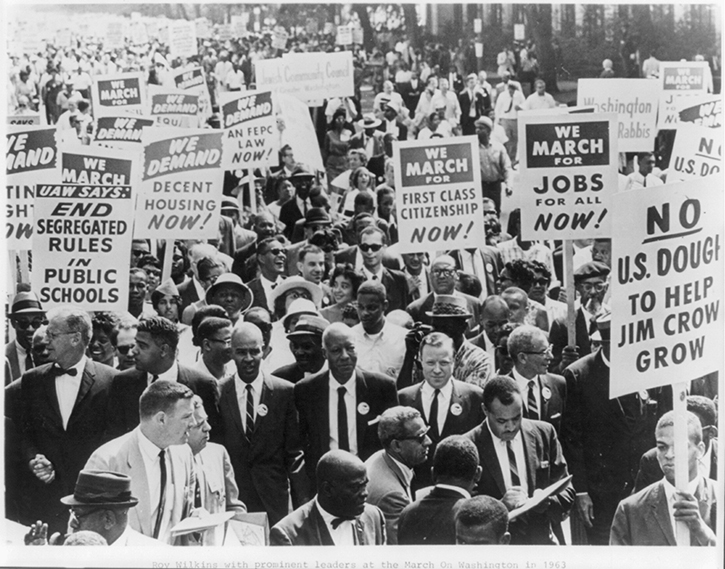For the last several years, we’ve been chronicling efforts by far-right activists like David Barton and the National Black Republican Association to claim that throughout American history it has been Republicans who have been the champions of civil rights while Democrats were the party of racists and it seems that this idea has now worked its way into the House of Representatives thanks to Rep. Virginia Foxx:
During a debate on the House floor today over designating 21 miles of the Molalla River as “wild and scenic,” Rep. Virginia Foxx (R-NC), who opposes the legislation, tried to claim a progressive environmental record for her party. “Actually, the GOP has been the leader in starting good environmental programs in this country,” said Foxx.
Foxx then extended her claims of the GOP’s progressive history to the issue of civil rights. “Just as we were the people who passed the civil rights bills back in the ’60s without very much help from our colleagues across the aisle,” said Fox. “They love to engage in revisionist history.”
A few years back, Barton produced an entire video pushing this idea. Entitled “Setting the Record Straight: American History in Black and White,” Barton’s presentation chronicled the decades of oppression and discrimination against Blacks for which Barton claimed the Democrats were entirely responsible, only to suddenly stop with the passage of the Civil Rights Act of 1964, completely ignoring the political transformation that overtook the country in its wake and the rise of the Republican Party’s “Southern Strategy” as we explained in our report:
Having been so eager to recount every historical Democratic disgrace, Barton falls silent when it comes to mentioning the split that emerged within the Democratic Party in the 1960s between the growing number who embraced the civil rights movement and those who continued to oppose it. Barton does not mention that President Johnson risked his career and his party’s future to do the right thing, nor does he mention that racist and segregationist southern Democrats left the party and were welcomed by the national Republican Party as part of its “Southern Strategy” to building power. Nor, of course, does he mention a particularly shameful modern-era example of that strategy – presidential candidate Ronald Reagan launching his 1980 bid for the presidency with a visit to Philadelphia, Mississippi to declare his support for states’ rights – with no mention of the town’s notoriety as the place where civil rights workers were murdered and townspeople jeered federal investigators.
Even an amateur historian like Barton shouldn’t be able to ignore that sordid history. In fact it’s so well documented that even RNC Chairman Ken Mehlman once openly acknowledged it in the context of his efforts to recruit African Americans into the Party. Mehlman gave an apology of sorts, saying “By the ’70s and into the ’80s and ’90s, the Democratic Party solidified its gains in the African American community, and we Republicans did not effectively reach out. Some Republicans gave up on winning the African American vote, looking the other way or trying to benefit politically from racial polarization. I am here today as the Republican chairman to tell you we were wrong.”
…
Even President Bush acknowledged that whatever prestige the Republican Party once had with African Americans has been squandered, telling the NAACP on July 20, 2006 that he understands why “many African Americans distrust my political party” and that he considers it “a tragedy that the party of Abraham Lincoln let go of its historic ties with the African American community. For too long my party wrote off the African American vote, and many African Americans wrote off the Republican Party” – admissions which were met with rousing applause from the audience.
But that is nothing compared to the efforts of Frances Rice of the National Black Republican Association, who prefers flat out lying about it:
The 30-year odyssey of the South switching to the Republican Party began in the 1970s with President Richard Nixon’s “Southern Strategy,” which was an effort on the part of Nixon to get Christians in the South to stop voting for Democrats who did not share their values and were still discriminating against their fellow Christians who happened to be black.
As we asked once before:
The obvious question raised by all of this is not why the Democrats are reluctant to discuss it, but why right-wingers who are obsessed with it never manage to explain the so-called “Southern Strategy” employed by Richard Nixon to win over traditional Southern Democrats who were angry by the party’s emerging pro-civil rights positions. As Nixon strategist Kevin Phillips explained it:
From now on, the Republicans are never going to get more than 10 to 20 percent of the Negro vote and they don’t need any more than that… but Republicans would be shortsighted if they weakened enforcement of the Voting Rights Act. The more Negroes who register as Democrats in the South, the sooner the Negrophobe whites will quit the Democrats and become Republicans. That’s where the votes are. Without that prodding from the blacks, the whites will backslide into their old comfortable arrangement with the local Democrats.
Ronald Regan’s strategist Lee Atwater was even more blunt about the reasoning behind the strategy:
“You start out in 1954 by saying, ‘Nigger, nigger, nigger,’ ” said Atwater. “By 1968, you can’t say ‘nigger’ — that hurts you. Backfires. So you say stuff like forced busing, states’ rights, and all that stuff. You’re getting so abstract now [that] you’re talking about cutting taxes, and all these things you’re talking about are totally economic things, and a byproduct of them is [that] blacks get hurt worse than whites.”
It’s amazing to see this sort of right-wing propaganda being spread on the floor of the House of Representatives.
Amazing, but sadly not surprising.








